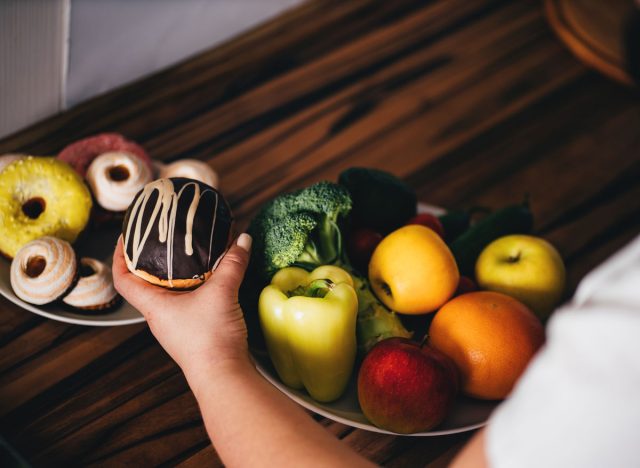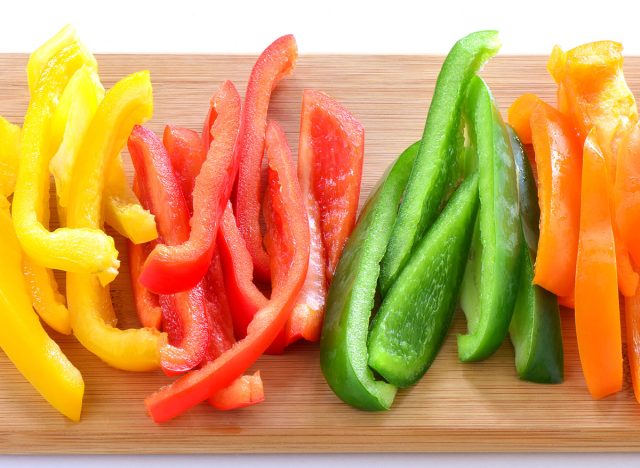Best Food Resolutions You Can Make in 2022, According to Our Medical Experts

There's nothing more satisfying than leaving behind a difficult year and looking ahead toward a fresh start. In fact, it's our love for new beginnings that make New Year's resolutions so popular every year.
People set resolutions related to all sorts of things, like finances, relationships, fitness, and healthy eating. But sometimes it can be difficult choosing a goal for yourself that you feel you'll be able to follow.
With this in mind, we decided to talk with the Eat This, Not That! Medical Expert Board to get their advice on the best food and healthy eating resolutions for 2022.
Here's what our board has to say about New Year's resolutions, and for more healthy eating tips, make sure to check out The 7 Healthiest Foods to Eat Right Now.
Add, don't take away.

"My wish for you in 2022 is to start really practicing an attitude of addition rather than subtraction. Please fight off the desire to cut food out and embrace what you can add in! Seeds (chia, flax, sesame, pumpkin, sunflower), microgreens, spices, fermented foods are all underrated foods that have powerful nutrient profiles. Sprinkle seeds on your toast, top your sandwich with microgreens, try recipes with turmeric and ginger and throw some kimchi in your grain bowl. Your brain and gut will thank you."
Sydney Greene, MS, RD
Enjoy the choices you make.

Say this next time you're enjoying a meal: "I am going to take the time to enjoy every bite of what I eat and enjoy the choices I consciously make. I am also going to stop dieting and find a healthy way of eating that will make sense for the rest of my life and allow me to enjoy eating."
Howard Grossman, MD
Worry less.

"My best food resolution is to worry less about what you should do with food and more about what food can do for you. Eating a variety of nutrient-dense foods can work wonders for your mind and body. This includes improving your gut microbiome, strengthening your immune system, boosting your mood, and fighting against chronic degenerative diseases. Stop micromanaging your food choices and instead, trust that food is your friend and an important aspect for well-being and longevity."
Lisa Moskovitz, RD, CDN, CEO of NY Nutrition Group
Plan ahead.

"You can make a grocery list, plan your meals ahead of time, and go shopping in your pantry first before going to the supermarket."
Chef Nik Fields
Make your goals approachable.

"When it comes to New Year's resolutions, I find that more approachable goals are more sustainable than completely giving up certain foods. Instead of a dry January, which can result in major binging in February thanks to complete deprivation, I like recommending a 'damp' January. Instead of giving up booze cold turkey, commit to having 1 to 2 drinks per week. Allowing those indulgences can make the journey much easier to stick to without feeling like you have to live without.
One simple resolution I like to suggest is taking a calcium and magnesium supplement before bedtime. Since many people are not meeting their calcium and magnesium goals, having the simple goal of taking this supplement pre-bedtime can help fill the gap while also possibly supporting quality sleep (thanks to the magnesium)."
Lauren Manaker, MS, RDN
Focus on the positive.

"Think about what you can add to your eating plan as opposed to what you should take away. For example, by being positive, and focusing on adding more healthier produce, you may no longer even want junk food anymore. Add fruit for breakfast, greens with your lunch, and try a new roasted veggie for dinner. Consider the 'power of one,' which means yes, you can have dessert, and yes you can enjoy a starch. Just pick your favorite one and enjoy it rather than banning dessert altogether. When faced with an assortment, choose the one you like most, practice portion control, and enjoy it!"
Lisa Young, PhD, RDN
Live by the 80/20 rule.

"So many people make strict goals for the new year, but the truth is, balanced goals that you can maintain over time are best! The 80/20 rule says 80% of the time focus on what you should be doing like eating fruits, veggies, whole grains, lean protein, and healthy fat. Then 20% of the time you can splurge a little and eat some of the foods that you shouldn't eat every day, but like to enjoy from time to time. The reality is, there will always be a vacation, happy hour, or celebration, so you have to learn to include those eating experiences into your eating plan without going overboard. The 80/20 rule can help you reach your goals and enjoy splurges from time to time."
Amy Goodson, MS, RD, CSSD, LD
Avoid the negative.

"Oftentimes, folks put a lot of negative energy around avoiding foods or taking away 'bad' foods from their diet. Instead, I recommend putting a positive spin on food and making the New Year's resolution to enjoy and savor every meal, every snack, and every morsel of food that goes into your mouth."
Toby Amidor, MS, RD, CDN, FAND
Try the red, orange, and green rule.

"This rule simply means that at each meal, you'll make sure to include either a red, orange, or green-colored fruit or vegetable. This way, you'll be making an effort to pick a beautifully colored food that will not only make your plate look more appealing, but will also help to make you feel satisfied with nutrient-packed wholesome, nutritious food that's rich in water, fiber, and anti-inflammatory compounds. Eating colorful produce helps to promote a healthy weight while assisting your body in staving off chronic diseases, like heart disease and diabetes. Meanwhile, concentrating on getting these colorful healthy foods on your plate will prevent you from focusing on the less healthy foods."
Tammy Lakatos Shames, RDN, CDN, CFT, and Lyssie Lakatos, RDN, CDN, CFT, also known as The Nutrition Twins.
Stop the fad dieting.

"Every single person signing up for [my program] starts the conversation by saying 'I've tried this, this, this, and this diet and nothing works.' And that's because they don't! Or at least not for the long game. You might get a quick 30-day fix because you ate no carbs, only drank juices, or lived on cabbage soup.
But these things aren't healthy for your body and mind, and they're not sustainable. So I beg you, no more fad diets again! Talk to me or anyone else who can help get you still eating the good stuff and still living your life in a healthy and delicious way."
Melissa Pfeister, RD








